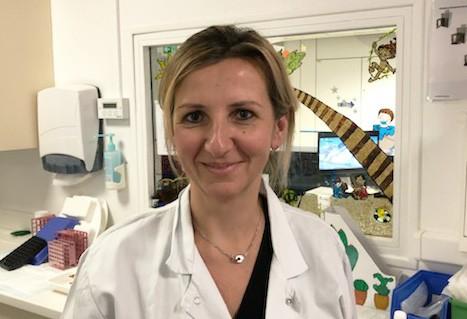
Agnès Linglart: Tracking down the genes that prevent the growth of children
Agnès Linglart is a pediatrician and researcher specialising in rare diseases affecting the skeleton and growth. She is 200% committed between her patients at the AP-HP Bicêtre hospital, her research in the Hormonal Signalling, Endocrine and Metabolic Pathophysiology Unit (Paris-Saclay University, Paris-Sud University, Inserm) and her students at the Paris-Sud Faculty of Medicine.
She is the head of the medical-university department of the Paris-Saclay hospital group "Child and adolescent health" and head of the department of endocrinology and childhood diabetes. Agnès Linglart also coordinates the Reference Centre for phosphocalcic diseases. This paediatric researcher treats children with diseases that affect the growth, shape and mineralization of bones. Half of them are rare diseases. "They can involve a lack of mineralization, such as in osteogenesis imperfecta, a defect or resistance to hormones very important for mineralization, or they can be diseases affecting the maintenance of calcium or phosphorus levels in the blood, necessary for skeletal construction, such as rickets."
From patient to therapy through research to therapy
"My research is translational. Questions will emerge from the observation of my patients and will guide the identification of pathological mechanisms, such as gene deficiency in cells. This will be followed by the research and development of therapeutic molecules, in collaboration with other experts and pharmaceutical companies," says Professor Linglart. This circuit is greatly facilitated by the proximity of the Bicêtre Hospital, the Hormonal Signaling, Endocrine and Metabolic Physiopathology Unit, and the Paris-Sud Faculty of Medicine where she teaches. "Bringing researchers and patients closer together is a French idea that is now inspiring other countries around the world. By working together, we are able to improve patient care and quality of life in 50 to 70% of cases, depending on the disease."
In 2010, Agnès Linglart's team identified a gene that caused diseases associated with hormonal resistance. "By closely observing the symptoms of patients with identical signs, we deduced where to find it logically." In the case of hypophosphatemic genetic rickets, which is another rare disease, doctors at the Reference Centre administered a new molecule to a first patient in France during a clinical trial. This was done a decade after understanding the mechanisms involved and while treatments were still poorly functioning. "His life was literally transformed," recalls Agnès Linglart.
Rare diseases
France is also a pioneer in the creation of reference centres for rare diseases. "By organising care, research and training, they considerably improve the diagnosis, care and treatment of all patients," says Agnès Linglart, who is the referent for rare phosphocalcic diseases, and especially rickets. "I lead a collective of patients, doctors, researchers and associations - such as K20 hormonal resistance and RVRH-XLH rickets -, gathered in a network called the OSCAR Rare Disease Health Network". She seized this opportunity to reconcile medicine and research, precisely when she returned from Boston in 2005, at a time when the French government was launching its Rare Diseases Plan. She began her career at Saint-Vincent de Paul Hospital, followed by Bicêtre Hospital where she was appointed Professor (PUPH) in 2013.
Female doctor
At 51 years old, Agnes Linglart is on all fronts. The place of women in medicine is her most recent focus. "I experienced the glass ceiling! I believe that my role today is to facilitate young women's access to exciting careers or professional projects. "Her personal example should encourage them: "I didn't hesitate to start two years in post-doc in Boston with my three children and came back with four!" She is proud of the editorial published in Le Monde in 2018 with other women scientists, which she believes has helped to change "even a little" people's behaviour. "I note that more parity is being discussed in the commissions." Finally, Agnès Linglart is pleased to collaborate in the creation of the European Global Health Challenges University run by the Paris-Saclay University, "this prestigious entity in progress".
